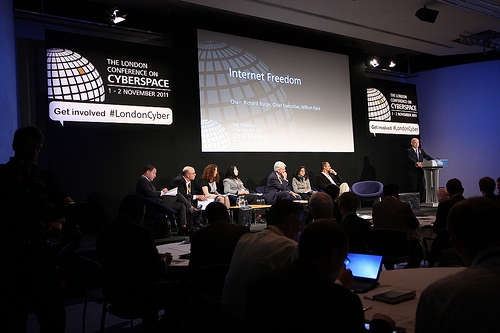
The advent and development of the Internet is transforming our world and revolutionising our everyday lives. The Internet can drive equitable and sustainable growth. It gives access to knowledge and the exchange of ideas. It nurtures innovation and investment. It improves opportunities for participation in social and economic activities for those on the margins. But the rise of the networked world has also produced significant challenges which could undermine these benefits and pose a serious threat to reaping the full potential of cyberspace. This affects us all. A secure, safe digital environment cannot be developed by governments alone. A safe and resilient cyberspace must be shaped by the interests of civil society, industry and governments across the globe. In tackling the threats, we must not allow improved security to come at the expense of fundamental human rights.
Earlier this year I proposed the following principles for governing behaviour in cyberspace, and called for a more focussed and inclusive dialogue between all those with a stake in the Internet – civil society and industry as well as governments - on how we might implement them:
- The need for governments to act proportionately in cyberspace and in accordance with national and international law;
- The need for everyone to have the ability – in terms of skills, technology, confidence and opportunity – to access cyberspace;
- The need for users of cyberspace to show tolerance and respect for diversity of language, culture and ideas;
- Ensuring that cyberspace remains open to innovation and the free flow of ideas, information and expression;
- The need to respect individual rights of privacy and to provide proper protection to intellectual property;
- The need for us all to work collectively to tackle the threat from criminals acting online; and
- The promotion of a competitive environment which ensures a fair return on investment in network, services and content.
The London Conference on Cyberspace began this more focussed dialogue on principles and set out an agenda for further work. The success of this agenda will be founded on the set of partnerships we have explored at this Conference. Our starting point must build on existing work, including the Geneva and Tunis World Summits on the Information Society. Our partnerships must remain inclusive, co-operative and collaborative to make certain we can build a secure, resilient and trusted global digital environment. This work will now go forward over the next 24 months with conferences in 2012 and 2013, graciously hosted by Hungary and South Korea respectively, to take stock.